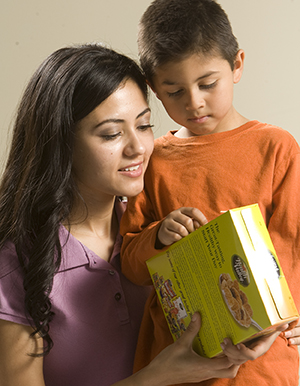When Your Child Has a Food Allergy: Egg
When a child has an egg allergy, eating even a small amount of egg can cause a life-threatening reaction. For that reason, your child must stay away from eggs and any foods that contain them. This sheet tells you more about your child’s egg allergy. You’ll learn what foods your child should stay away from, what to look for on food labels, and how to cook without using eggs.
Egg allergy: Foods to stay away from
Many of the foods your child eats daily may contain eggs. Some of the most common are:
-
Many baked goods, such as brownies, cakes, cookies, muffins, pastries, and some pies (cream or meringue). Some children are not allergic to eggs in baked goods. Your child’s allergy healthcare provider can tell you more.
-
Batter-fried and commercially breaded food, such as chicken nuggets
-
Breadcrumbs and commercial breads made with eggs or brushed with egg whites as a glaze. Stay away from any pastry products with a clear glaze.
-
Custards, puddings, and some ice creams and sherbets (check the label)
-
Drinks, such as eggnog, malted milk, and orange juice blended with milk
-
Specialty coffee beverages or alcoholic beverages. Eggs may be used in foam or topping.
-
Eggs in any form. This means yolks, whites, dried, powdered, and egg solids.
-
Egg noodles or commercially processed cooked pasta. Most dry, boxed pastas don’t contain eggs. But check the label.
-
All commercial egg substitutes
-
Marshmallows, marzipan, and nougat
-
Mayonnaise, unless the label plainly says it’s egg-free or vegan, and some salad dressings
-
Meatballs, meatloaf, and some sausages
-
Meringue
-
Pancakes and waffles
-
Pretzels, chips, and crackers
-
Clear soups clarified with egg white and soups with egg noodles
-
Tartar sauce, hollandaise, and other cream sauces
-
Frozen vegetables in sauce
What to look for on labels

U.S. manufacturers of packaged food items must state clearly on the label if it contains eggs.
Always read the whole ingredient label to look for egg. Egg ingredients may be within the list of the ingredients. Or egg could be listed in a “contains egg" statement under the list of ingredients.
Foods that don't contain egg could be contaminated during manufacturing. Unfortunately, labels like "processed in a facility that also processed egg" or "made on shared equipment" are not regulated by the FDA. They are voluntary. Talk with your child’s healthcare provider about whether your child may eat products with these labels or if your child should stay away from them.
Some foods and products don't have to state if they contain egg. These include:
-
Foods not regulated by the FDA
-
Cosmetics and personal care items
-
Prescription and over-the-counter medicines and supplements
-
Toys and crafts
-
Pet food
Allowed foods
There are many egg-free foods for your family to eat. Always check the label for eggs even if it is a food you have bought before. Recipes may change over time. Foods that are often egg-free include:
-
All cereals and grains, such as oatmeal and rice
-
All fresh, frozen, or dried fruits and vegetables
-
Baked, broiled, or roasted meats, fish, and chicken
-
Beans, lentils, and soups without egg noodles or eggs
-
Butter, vegetable oil, and eggless (or vegan) mayonnaise and salad dressings
-
Commercial or homemade breads without eggs. Sourdough, French, and Italian baguettes are often egg-free.
-
Dairy foods, such as milk, cheese, cottage cheese, and yogurt unless your child’s healthcare provider says otherwise
-
Gelatin, fruit crisp, and ice cream and sherbet made without eggs
-
Homemade cakes, cookies, muffins, pancakes, and waffles prepared without eggs
-
Tofu and other soy foods
Common substitutes for egg products
Most natural food stores and some grocery and specialty stores carry egg-free products and egg replacer. Egg replacer doesn’t contain eggs and is not the same as an egg substitute. You can also find sources of egg-free foods on the Internet.
When baking at home, use one of the following for each egg called for in recipes:
-
½ medium banana, mashed
-
¼ cup unsweetened applesauce
-
1½ tablespoons water, 1½ tablespoons vegetable oil, 1 teaspoon baking powder
-
1 cup boiling water mixed with 2 teaspoons of unflavored gelatin. Use 3½ tablespoons of the mixture to substitute for 1 egg.
-
1 teaspoon flaxseed meal mixed with 3 tablespoons of warm water. Let stand for 1 minute before using.
Talk with your child’s healthcare provider about vaccines
Experts now advise all people with an egg allergy to get the flu vaccine. On the other hand, the yellow fever vaccine contains traces of egg protein. This is not a routine shot. It is for certain international travel. If your child needs this vaccine, talk with your child's healthcare about how it might be safely given.
There are many areas of ongoing research that focus on understanding allergies and allergic reactions. Check with your child's healthcare provider about new research findings that may help your child.
If your child has ANY of the symptoms listed below, act quickly!
Use epinephrine medicine, such as an auto-injector or nasal spray, right away if it has been prescribed. Then call 911 right away.
-
Trouble breathing, wheezing, or a cough that won’t stop
-
Swelling of the mouth, throat, or face
-
Chest tightness
-
Low blood pressure
-
Dizziness, confusion, or fainting
-
Vomiting, nausea, belly pain, or diarrhea